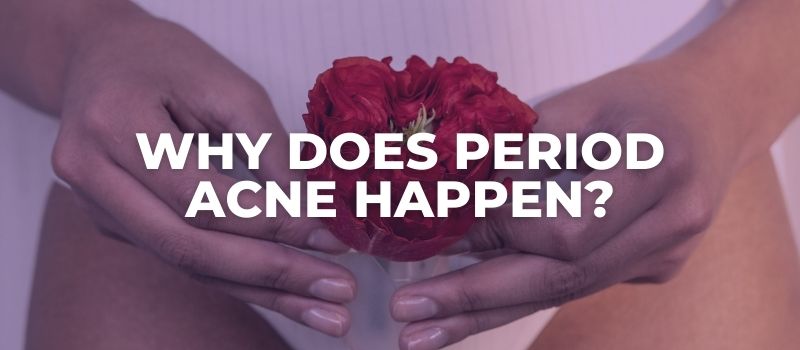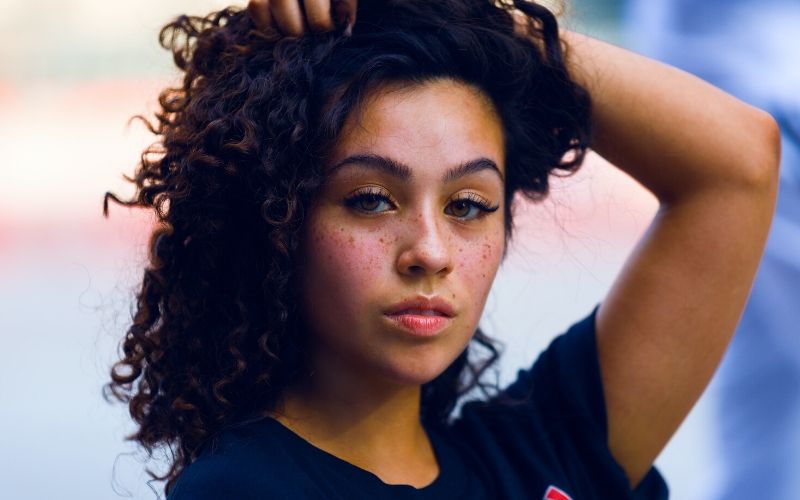Period acne is often misunderstood, with many blaming the menstrual cycle itself for the breakouts.
However, the reason you break out during your period is the rise in progesterone levels before menstruation which stimulates oil glands to produce more oil, leading to clogged pores and resulting in pimples.
And with each pimple taking a few days to a week to form, it seems like they coincide with your period.
While this process might seem inevitable, it doesn’t mean you’re powerless against it.
Read on to discover how to control and prevent acne breakouts before and during your period.

Why Do We Break Out During Period?
Period breakouts are caused by an increase in progesterone, which stimulates oil production, enlarges pores, and traps dirt, creating the perfect environment for acne-causing bacteria.
The main culprit behind period acne is hormones, particularly the hormone progesterone, which plays an important role in premenstrual and menstrual acne.
Progesterone levels rise during the second half of your cycle, and this hormonal change has a direct effect on the sebaceous glands, which are the oil-producing glands.
This increase in oil production causes the pores to swell and expand, additionally trapping dirt and creating a perfect airless environment for acne-causing bacteria to thrive inside the pore.
But when it comes to the skin, hormonal changes not only affect you during that time of the month – they affect your skin’s behavior almost all the time.
Hormones can also be blamed for triggering acne breakouts during puberty.
In this case, it is the male hormone androgen that fluctuates and directly stimulates the sebaceous glands to produce more oil and cause more clogging.
Additionally, hormones are also responsible for acne that develops or gets worse during pregnancy.
In this case, it is the male hormone testosterone which increases by 70% during pregnancy and directly stimulates the sebaceous glands to produce more oil and cause more clogging.
Furthermore, we are also susceptible to acne breakouts due to stress, and guess what?
This is also related to hormones – the hormone cortisol, in particular.
Cortisol is the body’s stress-reaction hormone that can stimulate the sebaceous glands to produce more oil which then leads to more clogging and acne breakouts.
At this point, you are probably thinking that your entire body is somehow against you.
But worry not; there are ways to control this, and we are slowly getting there.
How Do You Know If Your Acne Is Hormonal?
Here are the key indicators that can clarify if your acne is hormonal:
- Location: Hormonal acne is typically found around the jawline and cheeks. The appearance of acne in these areas is directly linked to the reproductive organs of the body.
- Timing: Flare-ups that coincide with certain points in your menstrual cycle can suggest hormonal acne.
- Pattern: Hormonal acne often leads to breakouts of pimples or zits not only on the face but also on the back, chest, and shoulders.
- Severity: Inflamed and discolored cysts along your chin area are a common sign of hormonal acne.
How Do You Stop Hormonal Breakouts?

Here are the most efficient ways to control hormonal acne and maintain clear skin:
Have a Complete Skincare Routine
A complete skincare routine is crucial in managing hormonal breakouts as it will tackle the external part of the issue, which is clogged pores, bacterial overgrowth, and inflammation.
A complete skincare routine should include:
- Cleanser: Removes dirt, oil, and impurities from your skin to prevent further pore clogging.
- Active Ingredients: These are substances like salicylic acid, benzoyl peroxide, or retinoids that can dissolve impurities, fight inflammation, and increase cellular turnover, helping to prevent clogged pores and acne.
- Non-Comedogenic Moisturizer: This type of moisturizer won’t clog your pores and will keep your skin hydrated and your barrier strong and functioning optimally.
- Sunscreen: Protects your skin from harmful UV rays, which can trigger more oil production and exacerbate acne, as well as acne scarring, such as post-inflammatory hyperpigmentation.
Change Your Diet
Foods such as sugar and dairy have been linked to acne due to their ability to cause inflammation in the body and elevate certain hormones that directly stimulate the oil-producing glands.
Excess oil production leads to clogged pores, which is when a pimple begins to form.
Now, it’s worth mentioning that although inflammatory, dairy and sugar may pose a greater risk for acne in those who are sensitive to their effects.
However, the inflammation and hormonal imbalance they can trigger can be counteracted by avoiding their consumption as well as including more anti-inflammatory foods in your daily menu.
Here are some examples:
Fatty Fish: Rich in omega-3 fatty acids that help soothe inflammation and promote the production of ceramides for a healthy skin barrier.
Avocado: Contains healthy fats and antioxidants like vitamins E and C that aid in the formation of healthy skin cells.
Green Tea: Packed with polyphenols that have anti-inflammatory properties and can also help prevent collagen breakdown, making your skin firmer, clearer, and more youthful-looking.
Berries: Rich in vitamin C, which helps fight free radical damage and promotes healthy cell development.
Oysters: Known as the best dietary source of zinc, an essential mineral that keeps the skin strong and resilient against inflammatory conditions by supporting cellular renewal and healing.
Pumpkin: Loaded with beta-carotene, which converts to vitamin A in the body, an antioxidant essential for skin health as it aids cell turnover and collagen production.
Dark Chocolate: Contains antioxidants that protect the skin from sun damage and promote healthy blood flow for a radiant complexion.
Replace Damaging Lifestyle Habits
Lifestyle habits such as excessive coffee drinking, poor sleep, dehydration, and lack of exercise can perpetuate inflammation and worsen hormonal acne.
For example, coffee can stimulate the adrenal glands into producing excess androgen, a hormone that directly stimulates excess oil production.
On the other hand, lack of sleep can elevate cortisol, a stress hormone that increases inflammation and exacerbates skin conditions such as acne.
Finally, dehydration and lack of exercise may cause your lymphatic system to become stagnant, which will impair its ability to eliminate toxins, including bacteria and artificial hormones we ingest daily through food or medicine.
Therefore, replacing destructive lifestyle habits with healthier ones, such as swapping coffee for green tea, getting enough sleep, introducing stress-managing techniques into your daily routine, and making sure to exercise regularly and drink enough water, can be huge steps towards improving hormonal and, consequently, skin health.
Try Supplements
Certain supplements can help improve hormonal health and manage hormonal acne.
They work by reducing inflammation, improving nutritional deficiencies, and balancing hormone levels, which can be beneficial in supporting overall skin health.
Here are a few supplements that may help manage hormonal acne:
Omega-3 Fatty Acids: Known for their anti-inflammatory properties, omega-3 fatty acids can help reduce the inflammation associated with acne. They also regulate hormones and can improve the skin barrier’s function.
Magnesium: Magnesium plays an essential role in hormone regulation. By improving sleep quality, magnesium can help manage stress levels, which can positively impact hormonal balance and potentially improve acne.
Zinc: Zinc is known for its anti-inflammatory and immune-supporting properties. It can reduce the inflammatory response to bacterial overgrowth and support skin healing.
Vitamin D: This vitamin is crucial for the immune system and can help fight inflammation. Some studies have found a correlation between low levels of vitamin D and acne.
Probiotics: These beneficial bacteria can improve gut health, which is closely linked to hormonal and skin health. Probiotics can reduce inflammation and have been shown to improve acne.
The Best Skincare Ingredients for Preventing Period Acne
There are countless excellent products on the market that can efficiently target clogged pores and work to exfoliate, get rid of excess oil, as well as soothe inflamed areas.
Some of the best acne treatments for preventing period pimples include:
Salicylic Acid
Salicylic acid is an oil-soluble component that emulates the skin’s natural exfoliation process by encouraging the shedding of dead skin cells and promoting the rapid formation of new cells.
Being oil-soluble, salicylic acid can also cut through the surface oil to dissolve the stiff plugs made of hardened oil, dead skin cells, and bacteria that are responsible for acne.
Finally, salicylic acid is known for its gentle, anti-inflammatory properties, is a well-tolerated component by most skin types, and requires minimal acclimation time.
Benzoyl Peroxide
Benzoyl peroxide is a molecule that works by infusing the pores with oxygen to destroy the airless environment the acne-causing bacteria prefer to live in.
Additionally, benzoyl peroxide also has a keratolytic effect, which means it exfoliates or peels the outer layer of the skin.
This process helps unclog pores, reduce inflammation, and speed up the removal of dead skin cells, thereby preventing the build-up that can lead to acne breakouts.
However, despite its effectiveness, it’s important to note that benzoyl peroxide can cause dryness and irritation, especially at higher concentrations or when used too frequently.
Therefore, it should be used cautiously, in moderate amounts and frequencies, and should be a part of a complete skincare regimen to minimize potential adverse effects.
Retinoids
Retinoids are a class of vitamin A derivatives known for their diverse array of skincare benefits.
The primary advantage of retinoids is their ability to accelerate skin cell turnover.
This means they help the skin shed dead cells more quickly and promote the growth of new ones, which results in less clogged pores and reduced acne, including more severe forms like nodules and cysts.
However, despite these benefits, it’s important to note that retinoids are commonly associated with initial side effects such as dryness, peeling, and increased sensitivity to the sun.
Therefore, it’s recommended to use retinoids with caution and as a part of a complete skincare regimen that includes a gentle cleanser, a nourishing moisturizer, and a broad-spectrum sunscreen.
The most effective retinoids for acne include retinyl propionate, adapalene, retinol, tretinoin, and tazarotene.

My name is Simone and I am a certified skin specialist. I created this website to teach my readers how to take great care of their skin and I also like to occasionally share my honest opinions on skincare products I’ve tried. You can learn more about me here.
